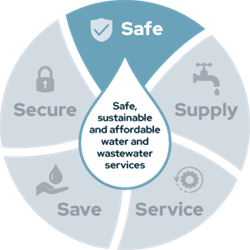Sewer blockages, overflows and odours
Sewer blockages
If you think your sewer is blocked, call Council at any hour of the day before you call a plumber to avoid a stink over a plumber’s bill.
Council does not automatically honour a plumber’s bill for unblocking a Council sewer if the plumber has been engaged privately without Council’s authorisation.
To avoid any potential conflict:
Call Council on 02 6670 2400 including after hours
One of Council's in-house plumbers will attend and check the Inspection Shaft and tell you:
- the blockage is in your pipes, that is between the inspection shaft and the house plumbing and you will need to call a plumber and fix it at your cost
- the blockage is between the inspection shaft and Council's wastewater treatment plant and will be fixed by Council at its cost.
- the blockage is likely shared between the parties (due to tree roots etc) and both parties may have to contribute to the cost of fixing it, or
- the cause of the blockage may be due to another problem, such as a poorly installed or modified inspection shaft, and the cause will need to be determined to identify the party responsible for fixing it.
Property owners who don't call Council before engaging a plumber risk paying the bill regardless of where the blockage is.
But for those property owners who feel confident that they can check the inspection shaft themselves, the rule of thumb is if it:
- contains wastewater or water, it’s probably Council’s problem and Council will fix it
- is clear, it’s probably the owner’s problem and the owner will need to hire a plumber at their own expense, or
- contains tree roots, it may be a shared problem and the cost to fix it also will be shared.
How to check your inspection shaft:
- Find it - it's usually in your front or backyard and covered with a plastic or cast iron lid about the size of a bread and butter plate.
- If it's overflowing, call Council immediately.
- If it's not overflowing, remove the lid and have a look.
See Factsheet - Gravity Sewer Responsibilities for further information on sewer inspection shafts.
Sewerage pump station overflows
Sewer Pump Stations form part of Council's reticulated sewer network and pump the sewage through sewer mains to the treatment plants. Tweed's Sewer Pump Stations are fitted with an orange light which flashes when an overflow occurs at the site. The Sewer Pump Stations are also connected to a telemetry system so in most instances Council will be aware of an overflow as soon as it occurs.
Overflows at Sewer Pump Stations are common during flooding. If the light is flashing during an extreme wet weather event, please do not call the number provided on the Sewer Pump Station. Flooding will cause most Sewer Pump Stations to overflow and Council will generally only be able to react once flooding subsides.
Sewage odour complaints
Council has a number of mechanisms in place to control odour from its facilities. If you have a complaint regarding odour, please consider first whether the odour is a result of:
- Internal sanitary drainage on your property - if there is a sewer blockage on your property, it is the responsibility of the resident or home owner to address the issue
- Wetlands or mangrove areas
- Stormwater channels
- Drainage
If you experience odour from Council's water or wastewater facilities (such as reticulation, sewer pump stations (SPS) or wastewater treatment plants), please contact Tweed Shire Council. Complaints will be recorded and investigated to determine the cause of the odour and the best way of addressing the issue.
Report a problem
For sewer blockages and overflows, call us 24/7 on 02 6670 2400.
For non-urgent issues - pump stations or restoration is required around sewer mains and inspection points - complete the online form.
